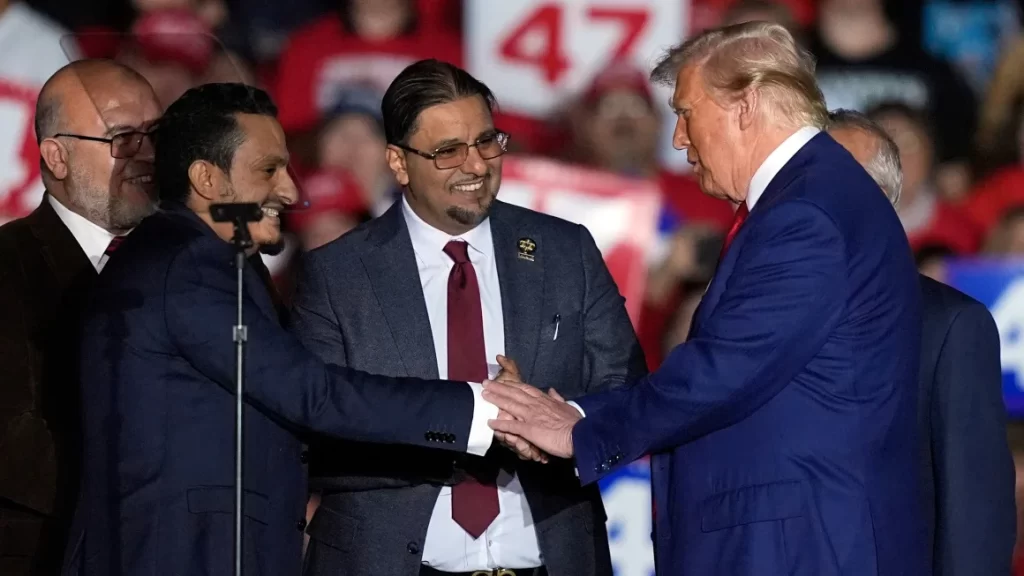Trump Courts Arab American and Muslim Voters in Michigan Amid Gaza Conflict
3 min read
Former President Donald Trump greets local Muslim leaders onstage at a campaign rally in Novi, Michigan, on October 26, 2024. Carlos Osorio/AP

Former President Donald Trump greets local Muslim leaders onstage at a campaign rally in Novi, Michigan, on October 26, 2024. Carlos Osorio/AP
Former President Donald Trump made a strategic appeal to Arab American and Muslim voters during a campaign rally in Novi, Michigan, as he seeks to capitalize on discontent over U.S. policies regarding the Israel-Palestine conflict. The rally comes at a pivotal time, as these communities are increasingly frustrated with the ongoing violence in Gaza and the perceived lack of adequate support from the current administration.
Speaking to a crowd in the Detroit suburb, Trump emphasized the importance of these voters, stating, “They could turn the election one way or the other.” Novi is located just 30 minutes from Dearborn, which became the first Arab-majority city in the U.S. last year.
Trump highlighted a recent meeting with Muslim leaders, showcasing them on stage alongside him. Among those present was Imam Belal Alzuhairi, who described Trump as a “peace” candidate. “We, as Muslims, stand with President Trump because he promises peace – he promises peace, not war,” Alzuhairi said, underscoring a narrative that positions Trump as a proponent of ending military conflicts in the Middle East.
While Trump has often criticized Israeli actions in Gaza, suggesting that Prime Minister Benjamin Netanyahu and his military should act more swiftly, he has also expressed discontent with President Joe Biden and Vice President Kamala Harris for what he perceives as insufficient support for Israel. The current administration has largely refrained from overt criticism of Israel, focusing instead on diplomatic responses to the conflict.
In a provocative interview, Trump mentioned the potential for redevelopment in Gaza, calling it a place with “the most beautiful weather, the water, the whole thing.” His remarks reflected a controversial blend of real estate speculation and insensitivity amid the ongoing humanitarian crisis.
The Trump campaign is attempting to leverage growing frustration among Arab Americans and Muslims regarding U.S. support for Israel’s military actions. They are positioning Trump as a candidate who can bridge the gap between anti-war sentiments and pro-Israel voters, suggesting that Democrats are failing to adequately support either side.
Trump has been outspoken in questioning why Jewish Americans would continue to support Harris, stating that they “should have their head examined” for doing so. His rhetoric at the rally extended to a broader coalition of faiths, claiming, “Jews, Catholics, evangelicals, Mormons, Muslims are joining our cause in larger numbers than ever before.” He emphasized that “Muslim and Arab voters in Michigan and across the country want a stop to the endless wars and a return to peace in the Middle East.”
In contrast, Vice President Harris, who has advocated for a ceasefire and a two-state solution, faced protests during her campaign appearances in Michigan. Activists have called on her to distance herself from current administration policies, especially regarding military aid to Israel. Recently, during a meeting with Arab American advocates, they urged her to make her stance clearer and more aligned with their concerns about the ongoing conflict.
Harris has received significant pushback from both pro-Palestinian advocates and anti-war activists, who argue that her position does not sufficiently diverge from Biden’s policies. At a rally in Kalamazoo, Michigan, she was interrupted by a protester demanding an end to the war in Gaza. Responding to the disruption, she reiterated the need to conclude the conflict and ensure the safe return of hostages.
As the election approaches, the dynamics between Trump, Harris, and the Arab American and Muslim electorate will be crucial. With Trump’s outreach aimed at mobilizing these voters, the extent of their influence on the upcoming election remains to be seen, especially given the heightened emotional climate surrounding the Gaza conflict.